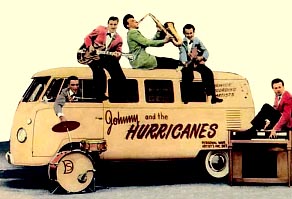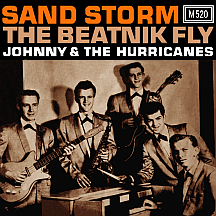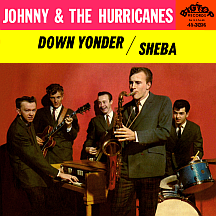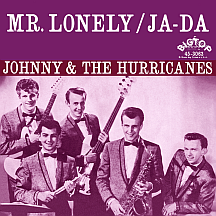JOHNNY AND THE
HURRICANES
The peak in popularity for Toledo, Ohio instrumental band Johnny and the Hurricanes was relatively short, spanning about two years from 1959 to '61, though many long-term fans were gained during that time. As good as the quintet's best selling singles were, most of those loyal followers agreed they weren't necessarily the best saxophonist Johnny Paris and company had to offer, due in part to a formula of retooling older pop songs as directed by producer and shot-caller Harry Balk. The really compelling Hurricanes gems can be found on 45 flip sides and album tracks, offering proof of the group's deserved place among the elite of late-'50s rock acts.
Several students at Rossford High (just across the Maumee River from Toledo) got together in 1957, briefly calling themselves The Black Cats before switching to the more timely Orbits (after all, the space race was heating up with the Soviet Union's launching of Sputnik that October). John Pocisk (originally from Walbridge, Ohio, a Toledo suburb several miles to the south) was the ringleader from the start; a fan of the sounds of sax-wielding stars Rudy Pompilli (of Bill Haley's Comets) and Sil Austin (who'd hit big with "Slow Walk" in '56), John took up the instrument. His best buddy, Paul Tesluk, played several instruments (accordion, mainly), showing off his rock and roll skills best on organ. Guitarist Dave Yorko, bassist Tommy Curran, trumpeter Mike Woods and drummer Don Staczek rounded out the original lineup.
Tesluk was a member of a local polka band, The Silver Tones, before and after getting on board with John's group, while at some point Curran was replaced by Lionel "Butch" Mattice. In addition to working their own gigs around the area, the Orbits sometimes played behind local singer Fred Kelly and his vocal group The Parliaments, a connection that got them in the door with Detroit record promoters Harry Balk and Irving Micahnik, who signed the sextet to a contract with their Talent Artists agency. At first they were strictly studio players, providing backup on several Parliaments tracks and "Oh This is Why" by The Dream Girls (with lead singer Bobbie Smith), issued on Balk and Micahnik's Twirl label in the spring of 1959.
One final name change, to Johnny and the Hurricanes, directly preceded the band's first 45, "Crossfire," a hot 'n' nasty, sax-heavy instro issued on Twirl in early '59 ahead of the Dream Girls disc. These early Twirl recordings were made in a former movie house, the Carmen Theater, the venue lending a natural reverb evident on the finished product. Woods was out by this time, Tony Kaye took over for Staczek on drums, and the act was set as a quintet. John changed his name to Johnny Paris and would soon be putting on airs in keeping with his self-imposed star moniker. After Balk arranged with New York's Warwick Records for wider release, "Crossfire" caught on, notching solid top 30 sales and airplay on national charts throughout June '59.
Acting on a preference for the music of his own youth, Harry Balk convinced the band to modernize some of his favorite standards of decades past. "Red River Valley," a late 19th century folk tune brought to prominence when Gene Autry sang it in the hit 1936 film bearing the song's title, was retooled as "Red River Rock," hardly as urgent a track as the band's debut disc, though it was considerably more popular with a strong run in the top ten during September and October. This success fueled Balk's concept that older songs were the way to go, leading to a series of gimmicky hit remakes (each strangely spotlighting Tesluk's organ over Paris's sax): "Reveille Rock" reworked the military bugle call for keyboard, complete with the Sergeant's bellow: 'All right you guys, rise and shine!' (meanwhile, non-hit B sides "Buckeye" and "Time Bomb" supplied Hurricanes fans with the hotter "Crossfire" follow-ups they craved). Early 1960 single "Beatnik Fly" (a thinly-veiled "Blue Tail Fly" sans the 'Jimmy Crack Corn and I don't care' vocal refrain) was the fourth hit in a row (its flip, "Sand Storm," unfortunately deserving of more radio exposure). Balk (as Tom King) and Micahnik (as Ira Mack) usually showed up on the labels as songwriters regardless of each song's original copyrights.
The group made the best of the sudden fame in spite of tight finances, which seems unthinkable for an act that had sold a few million records in less than a year's time. They bought themselves a Volkswagen Bus, had a spiffy Johnny and the Hurricanes logo painted on the side, loaded all their instruments, outfits, and themselves, into it and traveled around the country to promote the act. Kaye cracked under the pressure and was replaced by drummer Bill "Little Bo" Savich. Balk and Micahnik struck a deal with New York's Bigtop label, leaving Warwick Records (and, as it turned out, any further top 40 hits) behind; the first release, L. Wolfe Gilbert's "Down Yonder" (a major hit for honky-tonk female piano player Del Wood less than a decade before) stalled mid-chart around Independence Day in '60. An original tune, "Rocking Goose," came to life in the studio with Johnny achieving the squawking-gander sound effect by blowing into the saxophone's mouthpiece without the sax attached. It was their biggest hit in England, where singles had sold more impressively than at home and the group had been enthusiastically greeted on tour.

In an effort to reverse the downward sales trend (in the U.S., anyway), Balk hired a larger session band to beef up the sound of Hurrances records. "You Are My Sunshine" (a durable standard written by former Louisiana governor Jimmie Davis in 1940, it became another of Gene Autry's signature songs) and "Ja-Da" (a surprisingly contemporary take on a World War I-era chestnut) both scraped the bottom of the charts, the latter J&H's final U.S. chart single in early 1961 (that summer, they scored in the U.K. for the last time with the two-sider "Old Smokie" and "High Voltage"). In adverse proportion to the band's slipping fortunes, Johnny Paris became more convinced of his star power (it's been suggested he took a much larger share of the proceeds for himself) and began treating his longtime Toledo bandmates poorly, leading to a mutiny, as they departed to form The Fascinators, ultimately putting out a pair of singles (not surprisingly sounding very much like the Hurricanes) for the small Trans Atlas label in 1962.
Afterwards, Johnny ventured forth with replacement musicians - dozens of them over the years - finding bookings quite lucrative in the European market. During a visit to Germany in December 1962, they headlined at the Star-Club in Hamburg with opening act The Beatles (or "Beatels" as some of the posters proclaimed), who grudgingly played second fiddle just as their first single, "Love Me Do," was peaking in the top 20 on the U.K. charts; the engagement ended on the final day of the year and the Fab Four never returned to the Star-Club (but Johnny and the Hurricanes did, in 1964).
Paris and his rotating Hurricanes crew managed to remain with Bigtop (though hitless) through mid-1963, moving to the Mala label (as Balk and Micahnik's much more successful act Del Shannon also did some months later) for a pair of singles. In 1964, Paris started his own label, Jeff Records (changed soon after to Atila, odd though both names seem), putting out occasional singles whenever he could finance them while continuing to tour under the band's name. The former Hurricanes left the music biz, though guitarist Dave Yorko made attempts to sustain his love of music; in 1965, American Arts released his single "Chili Beans" (it's actually the same tune as Bobby Darin's "Come September") under the nostalgic name Dave and the Orbits.
Johnny Paris made the most of his fleeting late-'50s/early '60s fame, heading up his frequently-changing lineup of Hurricanes wannabes for another 40 years or so. While touring Europe (he did so many times, as demand remained high), he often hired backing musicians from the countries he visited. As far as anyone but the most diehard followers were aware, Johnny and the Hurricanes had been doing their instrumental thing together since the 1950s, though one suspects it wasn't hard to see through Johnny's ruse. The music was what mattered, and he kept it going strong until his death in 2006.
NOTABLE SINGLES:
- Crossfire - 1959
- Red River Rock /
Buckeye - 1959 - Reveille Rock /
Time Bomb - 1959 - Beatnik Fly /
Sand Storm - 1960 - Down Yonder - 1960
- Rocking Goose - 1960
- You Are My Sunshine - 1960
- Ja-Da - 1961
- Old Smokie /
High Voltage - 1961 - Farewell, Farewell - 1961
- You're to Blame - 1965
by the Fascinators - James Bond Theme - 1963
- It's a Mad, Mad, Mad, Mad World - 1963
- René /
Saga of the Beatles - 1964 - Chili Beans - 1965
by Dave and the Orbits - Wisdom's Fifth Take - 1966
- The Psychedelic Worm - 1967




